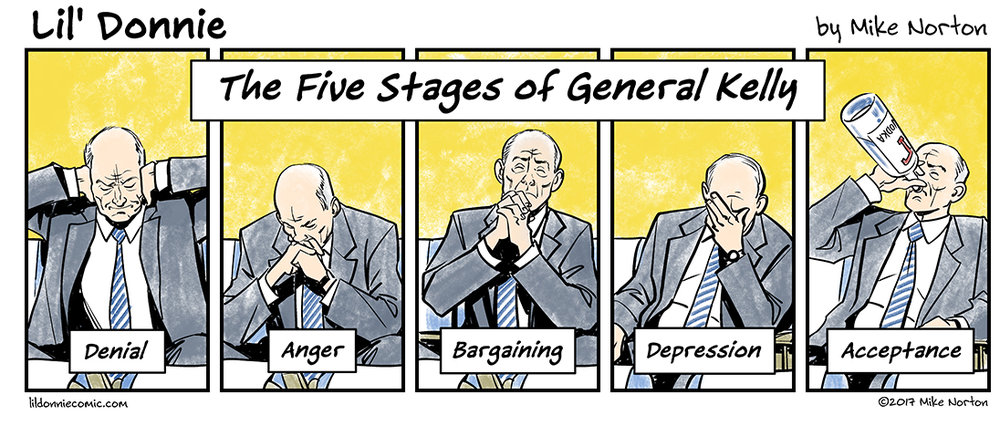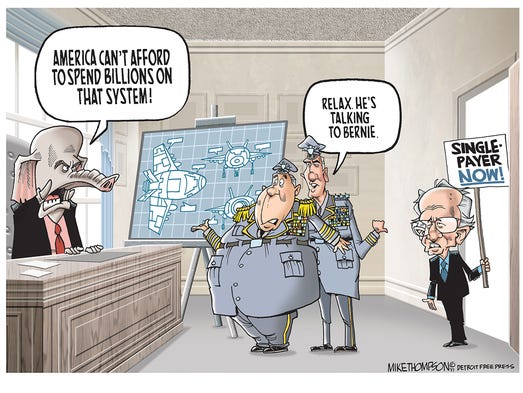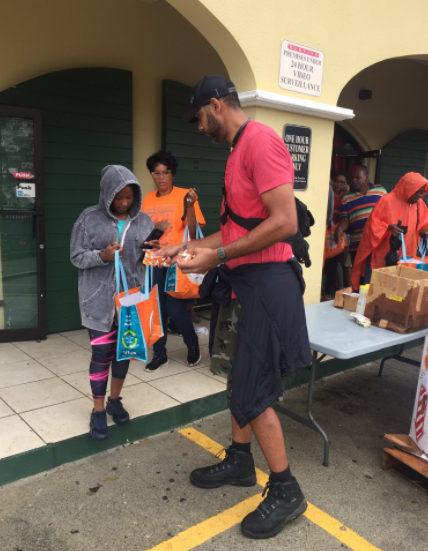Sunday, September 24, 2017
Thursday, September 21, 2017
Your Russia update
1. Paul Manafort is in deep дерьмо (derrmo).
In the middle of Donald Trump's presidential run, then-campaign chairman Paul Manafort said he was willing to provide "private briefings" about the campaign to a Russian billionaire the U.S. government considers close to Russian President Vladimir Putin.
Manafort's offer was memorialized in an email exchange with a former employee of his political consulting firm in July 2016. It was first reported by The Washington Post, which said portions of Manafort's emails were read to reporters.
Manafort spokesman Jason Maloni confirmed to The Associated Press that the email exchanges were legitimate but said no briefings ever occurred. The email involved an offer for Oleg Deripaska, a wealthy Russian who made his money in the aluminum business.
I would say that with an indictment pending, his troubles are just beginning. Let's hope this goes all the way to Trump himself, in a thread Bob Mueller is gradually and painstakingly unraveling ...
2. ... because Facebook ads bought by the Russians don't count as collusion, and don't count as 'hacking the election', either.
Just days after last year’s election, Facebook CEO Mark Zuckerberg told an audience that the suggestion that misinformation on his social network had any substantial effect on the outcome was “pretty crazy.” Now, imagine a disembodied Ron Howard narrator voice saying, “It wasn’t.” And then smash cut to … September 2017: Facebook is turning over evidence to federal investigators that Russian government–linked agencies bought Facebook advertisements with the intent of influencing the election. Today, it gets even weirder: The Daily Beast reports that a Russian-created, Trump-supporting Facebook group actually threw well-attended pro-Trump rallies in Florida.
As stories of Facebook being used by Russian agencies and trolls to influence the election trickle out, the general narrative — certainly Facebook’s narrative — has been that this is a misuse of Facebook, an abuse of its platform. In April, the company called the strategies used in last year’s election “insidious forms of misuse, including attempts to manipulate civic discourse and deceive people.”
Certainly, we can agree that it’s bad that hostile foreign powers are able to easily and cheaply sow discord and division among American voters. But it’s not at all clear to me that what Russia is doing is a “misuse” of Facebook. Isn’t this the company that explicitly markets its ability to influence and swing voters? Isn’t this the company whose decade-long mission has been to allow people on one side of the globe to communicate and influence people on the other side?
Didn’t Zuckerberg say last year, “We stand for connecting every person. For a global community. For bringing people together. For giving all people a voice. For free flow of ideas and culture across nations”? You don’t have to be particularly cynical to see how Russians sharing Trump memes falls under the “free flow of ideas across nations.” As Zuck put it: “We’ve gone from a world of isolated communities to one global community, and we are all better off for it.” Well, maybe we wouldn’t go that far.
The point is this: Facebook has always wanted, from a business and ideological perspective, to be a tool with which people can reach across the ocean and exert influence on one another. The problem is that 2016 is a case study in why mere connection is not enough to make something good. Cynically motivated Russian actors used Facebook to pose as grassroots Americans, and did so in support of an authoritarian reality-television star.
There are a lot of fresh questions raised here, particularly in that Daily Beast piece. Before we can move on to them, we have to agree on something: if Americans were big enough fools to have their votes swayed -- or even have their existing biases confirmed -- by Facebook ads, then the blame for Hillary (now Rodham again) Clinton losing does not lie in any of the various places she has strewn it in her recent book. It lies with the ignorance of the general electorate.
Not sure what Democrats can do to overcome that in 2018 and 2020, but I doubt that fighting the 2016 primary all over again is the answer.
3. There are some lingering questions about Russia's actual influence on the election, and they may still be waiting to be unearthed. Josh Marshall:
Over recent weeks we’ve learned much more about how Russian operatives used Facebook to support Donald Trump, attack Hillary Clinton and spread conspiracy theories pumped up the heat of the 2016 campaign. One big question has been: how effectively did they target those messages, given Facebook’s vast ability to target messages? And if they did target their messages to areas of particular Democratic weakness in states like Pennsylvania, Wisconsin and Michigan, how were they able to do that? Where did they get the data to drive the effort?
One possibility is obvious: Maybe the Trump campaign gave the Russians access to their data and voter files. To date, there’s at least no public evidence that this happened.
But maybe it didn’t have to.
Marshall refers back to this story of his, which I blogged about on June 2nd, and linked to him and the original in the WSJ (scroll down to "May 25"). You should finish reading Marshall's premise there; it's plausible and even ominous ... as long as you believe that the Russians hacked the DNC.
As mentioned here back in December, both Julian Assange and retired NSA and CIA analysts (not exactly the best of buddies, mind you) assert that the Clinton and DNC emails were leaked, not hacked. The latter two, William Binney and Ray McGovern, show their computer forensics analysis work to prove it. It's technical, but anyone with an understanding about computer data files and the speed with which they can be transferred will get it. On that basis, the DNC, etc. had -- perhaps still has, but go on by yourself and follow the Seth Rich or Imran Awan conspiracy theories -- an IT security breach of epic proportions.
Manafort should be on his way to prison, Facebook should be severely penalized, financially and in perhaps other ways (and you might consider deactivating your account to make 'em pay yourself, especially if you spend time there arguing over politics) and Democrats need to find the ball and then keep their eye on it. Trump's tax returns, collusion, emoluments, the 25th Amendment, some combo thereof ought to get it done.
All else is white noise.
Monday, September 18, 2017
The Weekly Wrangle
The Texas Progressive Alliance encourages continued support for Harvey (and Irma) relief efforts as it brings you this week's roundup.
Off the Kuff reminds us that we have elections this November and they still need our attention.
As part of job hunting, Socratic Gadfly pays careful attention to some of the fluffery and hyperbolic language in employment ads and job descriptions and translates some for you, likely as part of an ongoing series.
The question "what happened" was not answered by PDiddie at Brains and Eggs, but rephrased as: 'WTF are Democrats going to do going forward?' (Hopefully not more infighting.) He also had a good word to say about Houston mayor Sylvester Turner's efforts in managing the city's responses to Hurricane Harvey.
CouldBeTrue of South Texas Chisme wonders: what's worse? Denying food stamps to Harvey victims or refusing to register students to vote?
Turning 50 this week, Neil at All People Have Value offered a list of his favorite politicians in life. It is not a long list. APHV is part of NeilAquino.com.
jobsanger serves some pie charts that reveal the US still has way too many racists.
Grits for Breakfast helps Just Liberty kick off their podcast, 'Reliably Suspicious', with a launch party in Austin on Wednesday. Details are here.
Doyin Oyeniyi at Texas Monthly's Energy Department followed up on the largest Harvey-related oil spill, which occurred in Galena Park and went undiscovered for a couple of weeks.
Leah Binkovitz at Rice University's Urban Edge blog sees a nascent transformative moment for Houston's auto/carbon-centric culture: bicycles can keep the Bayou City rolling.
Houston Justice is shockedIsayshocked to findgambling in this casino racism in the so-called progressive movement.
DBC Green Blog posts about Medicare For All, the enthusiasm it's generating among progressives irrespective of party affiliation ... and one careful warning.
And Dos Centavos wonders if Trump's deal on DACA with Democratic Party leaders Chuck Schumer and Nancy Pelosi is just another tease. (If it is, Trump's base has swallowed the bait.)
More lefty blog posts and news from across our beloved Deep-In-The-Hearta!
CPPP's Better Texas blog breaks down some of the US Census's latest poverty and income numbers relevant to the Lone Star State.
NBA and Spurs star Tim Duncan is in his native US Virgin Islands assisting with Hurricane Irma relief, reports the San Antonio Current.
Daniel Williams at Equality Texas highlights the continued need for local non-discrimination ordinances in Texas.
Melissa Law at Houstonia denounces the idea that Harvey was anything but a catastrophe that is still ongoing.
It's Not Hou It's Me shares her mucking experience.
Juanita Jean rounds up some of the lesser 9/11 memorials.
Therese Odell at Foolish Watcher has a few of the late-night reactions to the Ted Cruz Twitter porn-liking saga.
Michael Li explains what happens next in the redistricting case.
Mean Green Cougar Red examines Harvey-related survivor's guilt.
Dan Wallach at Freedom to Tinker goes into detail about the security properties that a voting system needs to have.
Space City Weather looks back at all of the Harvey-spawned tornadoes.
And Harry Hamid shares some forbidden text.
Off the Kuff reminds us that we have elections this November and they still need our attention.
As part of job hunting, Socratic Gadfly pays careful attention to some of the fluffery and hyperbolic language in employment ads and job descriptions and translates some for you, likely as part of an ongoing series.
The question "what happened" was not answered by PDiddie at Brains and Eggs, but rephrased as: 'WTF are Democrats going to do going forward?' (Hopefully not more infighting.) He also had a good word to say about Houston mayor Sylvester Turner's efforts in managing the city's responses to Hurricane Harvey.
CouldBeTrue of South Texas Chisme wonders: what's worse? Denying food stamps to Harvey victims or refusing to register students to vote?
Turning 50 this week, Neil at All People Have Value offered a list of his favorite politicians in life. It is not a long list. APHV is part of NeilAquino.com.
jobsanger serves some pie charts that reveal the US still has way too many racists.
Grits for Breakfast helps Just Liberty kick off their podcast, 'Reliably Suspicious', with a launch party in Austin on Wednesday. Details are here.
Doyin Oyeniyi at Texas Monthly's Energy Department followed up on the largest Harvey-related oil spill, which occurred in Galena Park and went undiscovered for a couple of weeks.
Leah Binkovitz at Rice University's Urban Edge blog sees a nascent transformative moment for Houston's auto/carbon-centric culture: bicycles can keep the Bayou City rolling.
Houston Justice is shockedIsayshocked to find
DBC Green Blog posts about Medicare For All, the enthusiasm it's generating among progressives irrespective of party affiliation ... and one careful warning.
And Dos Centavos wonders if Trump's deal on DACA with Democratic Party leaders Chuck Schumer and Nancy Pelosi is just another tease. (If it is, Trump's base has swallowed the bait.)
================
More lefty blog posts and news from across our beloved Deep-In-The-Hearta!
CPPP's Better Texas blog breaks down some of the US Census's latest poverty and income numbers relevant to the Lone Star State.
NBA and Spurs star Tim Duncan is in his native US Virgin Islands assisting with Hurricane Irma relief, reports the San Antonio Current.
Daniel Williams at Equality Texas highlights the continued need for local non-discrimination ordinances in Texas.
Melissa Law at Houstonia denounces the idea that Harvey was anything but a catastrophe that is still ongoing.
It's Not Hou It's Me shares her mucking experience.
Juanita Jean rounds up some of the lesser 9/11 memorials.
Therese Odell at Foolish Watcher has a few of the late-night reactions to the Ted Cruz Twitter porn-liking saga.
Michael Li explains what happens next in the redistricting case.
Mean Green Cougar Red examines Harvey-related survivor's guilt.
Dan Wallach at Freedom to Tinker goes into detail about the security properties that a voting system needs to have.
Space City Weather looks back at all of the Harvey-spawned tornadoes.
And Harry Hamid shares some forbidden text.
Subscribe to:
Posts (Atom)









